
Related
Topics
Ricardo Alarcon responds to charges that Cuba is cracking down on 'independent librarians' and he calls for the immediate extradition of Luis Posada Carriles — the anti-Castro militant being held in Texas. [includes rush transcript]
In 2003, Cuba arrested seventy-five people–among them around ten librarians. Columnist Nat Hentoff among others has written extensively about this. Hentoff recently quoted author Ray Bradbury who wrote Fahrenheit 451, a book condemning the practice of book burning. Bradbury said he had a message for Cuba. He said “I plead with Castro and his government to immediately take their hands off the independent librarians and release all those librarians in prison and to send them back into Cuban culture to inform the people.” Alcaron responds to this.
Finally, Ricardo Alarcon discusses what Cuba would like to see happen with the Cuban-born anti-Castro militant Luis Posada Carriles.
- Ricardo Alarcon, President of the Cuban National Assembly
Transcript
AMY GOODMAN:I asked Ricardo Alarcon for his response.
RICARDO ALARCON:There have been some discussions about the librarians at some meetings of U.S. librarians. I have read very serious reports and very serious decisions taken by the Americans — American librarians demystifying completely that campaign of the so-called independent librarians is very simple. The U.S. government has a very old plan to fabricate, I’m quoting them, fabricate an opposition inside Cuba, as old as 1959, the so-called Cuban Project. You may visit now — now the website of the AID, and you will find there specific references to payments and promotions to so-called independent journalists and independent librarians. There is no painting, independent painters, Maybe that’s why they are not mentioned in these papers. It suffices to work for the U.S. government to receive the title of journalist or writer or librarian. It should not be that way. A librarian is a professional like a writer or like a singer or whatever, a professional.
AMY GOODMAN: So, why were these 75 people arrested and sentenced up to 28 years in prison?
RICARDO ALARCON: Well, it depends. Some got the sentence —- the sentences were different. That was different perhaps to the maximum that was applied to one person. Cuba has not only the right but the obligation to defend itself. We do not attack anybody. We do not intend to change by force the U.S. regime or any other regime, but we have—- not only the right, but the obligation to defend ourselves. I was referring to that plan. I am not talking about ancient history. On May 24, Mr. Bush presented the so-called plan of assistance to a free Cuba. It is there in the first page the most important step now is to increase the material support to those peoples. Remember also, in what countries—
AMY GOODMAN: I’m looking at that report right now. The Report of the Commission for Assistance to a Free Cuba.
RICARDO ALARCON: Yes.
AMY GOODMAN: From the Department of State website.
RICARDO ALARCON: There are many things that are available in the official — the U.S. government website. In those days of February, 2003, remember that in this program and in many others what was the main concern? The threat of an imminent war, what happened later in Iraq. All around the world people were demonstrating against that war, before the war started. Remember that the last weekend of February, all around the planet, were demonstrations. Only in one place there was a different kind of demonstration, a pro-war demonstration, that was Miami Dade county. That demonstration was called for in a public manifesto, published in the Miami papers.
Imagine who was the designer of that manifesto? Orlando Bosch Avila. He has the capability, the appeal to call for a public demonstration that was attended in the front row by some Federal officials, including the two — at that time the two congresspersons from Dade county. And other people. They were in front of that demonstration with a big banner saying, “Iraq now, Cuba next.”
We were being threatened at that moment with going through the same experience that was imposed later on the Iraqi people. But more than that, do you remember the reason why you were still— you were there for a long time, I’m afraid, in Iraq? Were not these weapons of mass destruction, they told you this that Saddam had and all of that story, do you remember? Well, in those days, Mr. Bolton, who is not an independent librarian, now he’s the ambassador to the U.N., at that time he was the assistant Secretary of State. Mr. Bolton was accusing Cuba of having some weapons of mass destruction.
In those days, there were also statements by a man by the name of Roger Noriega, who at that time was the assistant secretary for inter-American affairs. There was an incident of a boat that was kidnapped in Havana by some individuals willing to immigrate to the U.S. using that boat. Mr. Noriega said in those days that a repetition of such acts would be considered by the U.S. as an act of. aggression from Cuba. Regular immigration from Cuba to the U.S. as a WMD as an act of aggression. To be accused of attacking the U.S., to be accused of having even WMDs in those days was not something to play around with.
No responsible government cannot work that way. We knew that these individuals were working with the U.S. for many years, some of them. We had our own laws to protect ourselves, that we drafted the first one following the example of Canada, Argentina, Mexico, the European Union, the United Kingdom, all of those countries I mentioned have protective laws against Helms-Burton. They have to do that because your laws, such as Helms-Burton, are illegal because those laws interfere in other countries. They deny their sovereignty. But of course, the main target of that law is Cuba, not UK, but UK Defends itself with the law. Cuba has to do the same. We also declared a crime to work for the purpose of implementing that law is the same language that the Canadians have. The problem is how do you implement that law in Canada where it’s only to contribute to affect Canadians’ investment in Cuba or trade and give information to the U.S. authorities to try to put some pressure — help in the pressure against the trade with Cuba. But in the Cuban case, you may get information about what the — an American is doing to — we have proof of that, even there have been examples of people who have been punished, punished because they had traffic with some so-called property. And somebody in Miami had claimed that a man should be punished because he’s doing that. How did that person know? Because somebody sent him from Havana, that information, a photo and so on.
Just to give an example, that we had the same right. But we didn’t — to protect ourselves, we didn’t exercise that until we were in a very dangerous moment, real danger. Now it’s repeated at the time where the administration appears to believe that they could go around the world making war here, there, and so on without any trouble. Now, there may be some rethinking, because of their experience, but at that time it was a very dedicated moment for us.
AMY GOODMAN: Finally, I asked Ricardo Alarcon what Cuba would like to see happen with the Cuban-born anti-Castro militant, Luis Posada Carriles.
RICARDO ALARCON: According to the law, he should have been extradited to Venezuela. That’s very clear in the bilateral treaty that exists between the two countries. The U.S. is in violation of at least three very important legal documents — one is Security Council resolution 1373, drafted and introduced by the U.S. and adopted unanimously on September 28, 2001. That was the international community’s reaction to 9/11. There it is written that you cannot use any political motivation not to extradite somebody accused of a terrorist act. But there are two international conventions. The Montreal convention for the suppression of acts — illegal acts against civil aviation, and the convention against acts of terror committed with bombs. Article 7 of the Montreal and 8 of the other, I think, are crystal clear. It is said there that when you have under your custody somebody that is requested for extradition to be in connection with the attack — attack of a civilian airplane, if for any reason you don’t extradite that person, that country, the country where the accused person is found, without any exception whatsoever — I am quoting, Amy, without any exception whatsoever is obligated to try that person in their — in the country where he was found as if his crime has been committed there. In other words, the legal dilemma for the administration is whether to extradite or to try Mr. Posada here by the same crime as if it was not a Cuban airplane, but an American airplane. It didn’t happen in Barbados but over Nebraska. As if it were a crime committed here. There is a third option, to violate those treaties, to protect him — that is unfortunately what is still happening.
AMY GOODMAN: And the crime he should be charged with, you believe?
RICARDO ALARCON: The crime?
AMY GOODMAN: The crime that he should be charged with in this country. He is now being held on immigration for illegally entering into the country. But what do you believe he should be charged with?
RICARDO ALARCON: He should be — he has to be sent to Venezuela to continue the trial that was going on against him in connection with the destruction of the Cuban airplane. If the U.S. doesn’t do that according to the Montreal Convention the only option they have is to do that trial here.
AMY GOODMAN: Ricardo Alarcon, the number two man in Cuba under Fidel Castro, President of the Cuban National Assembly.

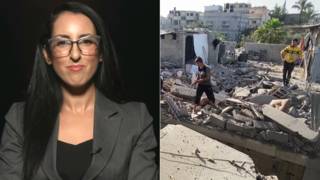
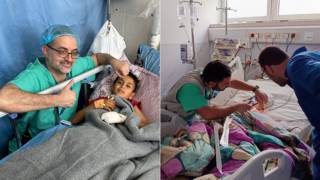
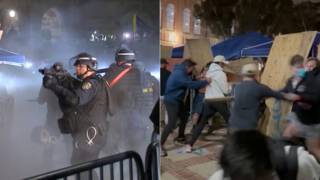
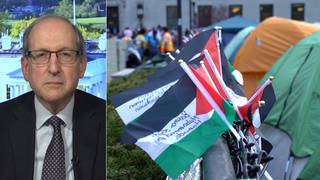






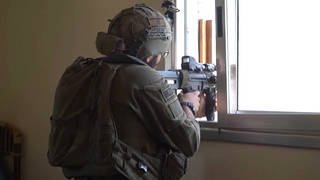
Media Options